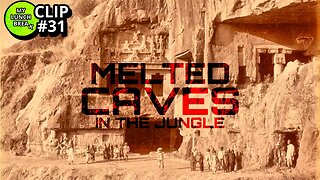Premium Only Content

Neuroscience Confirms Buddhism's Insight on the Fluid Self
#Neuroscience #Buddhism #FluidSelf
#Mindfulness #SelfAwareness #Meditation
#ScienceAndSpirituality #CognitiveScience #BuddhistPsychology #Consciousness #NeuroscienceMeetsBuddhism #MindBodyConnection
#PhilosophyAndScience #UnderstandingTheSelf
#TransienceOfSelf #nyc #podcast #newvideo #new #fyp
the age-old debate of "Who am I?"—a question that has puzzled philosophers, theologians, and now, neuroscientists. For centuries, Buddhism has been calmly sipping its tea, nodding sagely, and saying, "There is no constant self." Meanwhile, neuroscience has been frantically dissecting brains, running MRI scans, and scribbling on whiteboards, only to arrive at the same conclusion. Let's dive into this delightful convergence of ancient wisdom and modern science, shall we?
The Buddhist Perspective: Enlightenment and Emptiness
Buddhism, with its serene monks and tranquil temples, has long preached the concept of Anatta, or "no-self." According to this philosophy, the self is an illusion, a transient collection of thoughts, feelings, and experiences that are constantly changing. Imagine trying to catch a cloud with a butterfly net—futile, right? That's the Buddhist view of the self. It's like trying to hold onto a soap bubble; the moment you think you've got it, it pops.
Buddhists have been meditating on this for millennia, achieving states of enlightenment that make them look like they've just discovered the secret to the universe (spoiler: they kind of have). They understand that clinging to the idea of a permanent self is the root of all suffering. So, they let go, live in the moment, and achieve a state of blissful detachment. Easy peasy, right? Well, not quite. It takes years of practice, discipline, and a lot of sitting still.
Neuroscience: The New Kid on the Block
Enter neuroscience, the new kid on the block, armed with fancy gadgets and a burning desire to understand the human brain. Neuroscientists have been poking around in our gray matter, mapping neural pathways, and studying brain activity with the enthusiasm of a kid in a candy store. And what have they found? Surprise, surprise: there is no single, unchanging self.
Neuroscience tells us that our sense of self is a construct, a byproduct of various brain processes working together. Our identity is shaped by our memories, experiences, and the constant chatter of our neurons. It's like a never-ending improv show where the actors keep changing roles and the script is rewritten every second. One moment you're the hero, the next you're the comic relief, and sometimes you're just an extra in the background.
The Great Convergence: Science Meets Spirituality
So, here we are, with neuroscience finally catching up to what Buddhism has known all along. It's like watching a slow-motion race where the tortoise (Buddhism) has been chilling at the finish line for centuries, and the hare (neuroscience) is just now stumbling across it, panting and out of breath.
But let's give credit where credit is due. Neuroscience has provided us with fascinating insights into how our brains work. It's shown us that our sense of self is fluid, influenced by everything from our environment to our genetic makeup. It's like discovering that your favorite TV show has been improvised all along—mind-blowing, right?
The Takeaway: Embrace the Chaos
So, what can we learn from this delightful convergence of ancient wisdom and modern science? First, let's stop taking ourselves so seriously. If our sense of self is just a fleeting construct, why not have a little fun with it? Embrace the chaos, the constant change, and the unpredictability of life. Be the hero, the comic relief, and the extra all at once.
Second, let's practice a little more mindfulness. Take a page from the Buddhist playbook and learn to live in the moment. Meditate, breathe, and let go of the need to define yourself. After all, if there's no constant self, why waste time trying to pin it down?
In conclusion, whether you're a monk meditating in a temple or a neuroscientist in a lab coat, the message is clear: there is no constant self. So, let's all take a deep breath, relax, and enjoy the ever-changing ride that is life. And maybe, just maybe, we'll find a little enlightenment along the way.
-
 LIVE
LIVE
The Charlie Kirk Show
1 hour agoTulsi Confirmed! + A Ukraine Deal? + Radical Judges Against Trump | Sen. Mullin, Marlow | 2.12
9,593 watching -
 1:01:01
1:01:01
The Dan Bongino Show
4 hours agoThe Trump and Elon Tag Team Rock The Deep State (Ep. 2421) - 02/12/2025
495K692 -
 1:05:54
1:05:54
Timcast
3 hours agoDemocratic Party IMPLODES, Voters QUIT As Dem TANK In Polls, Go To War With Elon Musk | Timcast LIVE
79.1K76 -
 LIVE
LIVE
Grant Stinchfield
1 hour agoPresident Trump is Winning... But the D.C. Bureaucracy has a NOT so Secret Weapon
1,534 watching -
 54:38
54:38
The Rubin Report
2 hours agoCNN Host Angrily Snaps at Republican After Seeing Elon Musk’s Proof of Waste
57.2K36 -
 2:14:25
2:14:25
Steven Crowder
3 hours ago🔴 Why China Will beat the US and Why Nobody Can’t Stop it | GUEST: Tim Pool
344K240 -
 LIVE
LIVE
Jim Jordan
3 hours agoThe Censorship-Industrial Complex
1,177 watching -
 LIVE
LIVE
LFA TV
17 hours agoTULSI GABBARD CONFIRMATION LIVE! | LIVE FROM AMERICA 2.12.25 11AM
5,380 watching -
 1:30:32
1:30:32
Caleb Hammer
2 hours agoThe Most UNHINGED Financial Audit
30.8K -
 41:00
41:00
MYLUNCHBREAK CHANNEL PAGE
23 hours agoMelted Caves in the Jungle
26.1K14